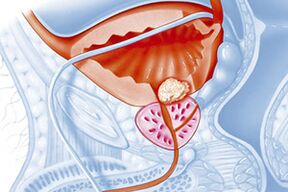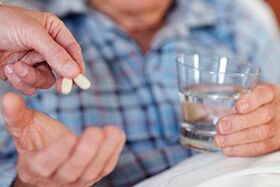Chronic prostatitis is an inflammatory disease of the prostate, which is characterized by organic tissue changes and functional diseases of the prostate, male reproductive system and urethra.

The prostate is a tubular alveolar gland found only in men. This gland is involved in sperm production and is located under the bladder around the beginning of the urethra. Chronic prostatitis in men may be caused by infection of the prostate from the bladder through the pelvis through the blood and lymph vessels through the bladder or in other ways. Although the presence of an infection may not cause illness or impotence, the infection usually does not go away for a person who has no trace. At this moment, the man is observing a decrease in the hardness of the penis, sexual dysfunction and urinary system diseases in his sexual life.
Chronic prostatitis does not threaten a person's life, but it can still cause psychological distress and deterioration of family relationships. It should also be pointed out that according to experts, chronic prostatitis, that is, not treated in time, will not only lead to serious complications, but also cause prostate cancer. In fact, in addition to infection, there are many other factors that cause chronic prostatitis. However, the manifestations and exacerbations of chronic prostatitis have different characteristics.
Stages of chronic prostatitis
Although there is still no single specificity for the development of chronic prostatitis, experts divide it into the following types:
- I have acute bacterial prostatitis;
- The bacterial origin of prostatitis. It is the most common.
- III. Chronic nonbacterial prostatitis is a symptom complex of chronic pelvic pain, lasting more than 3 months;
- Type IIIA is an inflammatory form of chronic prostatitis in which the level of white blood cells in prostate secretions is elevated;
- IIIB is a non-inflammatory form of chronic inflammatory prostatitis. There is no increase in the level of white blood cells and pathogens in the prostate secretion.
- Type IV is diagnosed as asymptomatic chronic prostatitis, which does not cause pain, and is discovered accidentally based on the analysis of prostate secretions or biopsy tissue.
The frequency and cause of this type of chronic prostatitis are still unclear. As for the reasons for the development of other types of diseases, it should be pointed out here that they may be due to the penetration of various infectious microorganisms into the ureter and violation of various functions in the human body.
Prevention of prostatitis
Chronic prostatitis requires long-term treatment. Therefore, it is best to take preventive measures to avoid this situation. To this end, patients only need to make some adjustments to their lifestyle, which not only benefits the overall health, but also alleviates the disease. Therefore, first of all, the following precautionary rules must be observed:
- Strive to live a healthy lifestyle;
- Eliminate spicy foods completely from the diet;
- Don't abuse alcohol;
- Do physical exercises, including exercises that help strengthen muscles and improve blood circulation in the pelvic organs;
- Feel free to participate in yoga classes;
- Observe the prevention and treatment methods of infectious diseases;
- Eliminate pelvic congestion and treat rectal diseases in time;
- Exclude excessive masturbation;
- Try to have a regular but safe sex life;
- Avoid hypothermia;
- Don't sit on a cold surface;
- In sedentary work, you should warm up more.
In addition to these preventive measures, men should also consider the fact that the symptoms of chronic prostatitis are not obvious. Therefore, if a person observes discharge during urination or defecation and also feels mild pain, then in this case, it is worth seeking medical attention immediately. It is also worth remembering that the treatment process should be carried out strictly under the supervision of a specialist and should not be ignored. In addition, the choice of drugs during antibiotic treatment is only based on the specific conditions of the patient, and can only be done after the patient has undergone special research. The intake of prescription drugs should not be interrupted, and even more so, and other drugs should not be taken without a doctor’s prescription. Don't delay the doctor's appointment. By searching on our website, you can easily find a clinic that suits both the location and the price policy.
Causes of prostatitis
Medical chronic prostatitis is positioned as a multi-cause disease. In addition to the infection penetrating the ureteral organs, it may also occur and recur due to the emergence of neurotrophic and hemodynamic diseases, as well as the weakening of the immune system and autoimmune, hormonal or biochemical processes. Prostatitis can develop in the context of the following diseases:
- Frustrated;
- Neurogenic bladder dysfunction;
- Reflex sympathetic dystrophy;
- Inflammatory processes in nearby organs;
- Bladder neck hypertrophy;
- Prostate adenoma
- Urethral stricture;
- Rectal diseases.
In view of these factors, the following reasons can be attributed to the risk of prostate inflammation:
- A sedentary lifestyle, especially the sitting posture, can lead to dysfunction of the blood supply to the pelvic organs;
- Local body hypothermia;
- constipation
- Irregular sexual relations or sudden fatigue;
- Chronic infection
- Previous sexually transmitted diseases. Especially their delayed treatment;
- Malnutrition
- lack of sleep;
- Chronic stress.
In addition, chronic non-bacterial prostatitis may be caused by the formation of myofascial trigger points during disease, injury, and surgical operations on pelvic organs.
Chronic prostatitis symptoms

The symptoms of chronic prostatitis have little effect on men. Inflammation of the prostate occurs suddenly. Acute pain in the perineum and groin area may bother the patient, as well as pain during urination and defecation, accompanied by urethral discharge. All these signs of chronic prostatitis can be accompanied by fever, fever and fever. Usually, these symptoms are intermittent. Moreover, chronic prostatitis can be expressed in the form of complications of sexually transmitted diseases. During the course of the disease, the patient may feel discomfort when urinating, pain in the perineum and the appearance of discharge. Chronic inflammation of the prostate leads to erectile dysfunction and delayed ejaculation.
The inflammatory process of the prostate goes deep into the urinary system and can lead to cystitis and pyelonephritis. In most cases, these exacerbations end in inflammation of the testicles and appendages, which require infertility and long-term treatment. Therefore, you should not postpone going to the doctor. Need timely diagnosis and treatment. It is important to remember that chronic prostatitis can be cured if it does not cause the disease.
Diagnosis of chronic prostatitis
Usually, doctors can diagnose this or another type of chronic prostatitis based on the patient's instructions or symptoms after examination. First, the expert will palpate the prostate, and then advise the patient to conduct laboratory studies on the urine incubator and prostate secretions. This diagnosis allows you to determine further treatment for chronic prostatitis. In addition, urologists can use the following diagnostic methods:
- Transrectal ultrasound examination allows you to determine the size and volume of the prostate and determine whether there is a tumor;
- Determining the urethral pressure curve can find out the cause of urinary system diseases and the function of pelvic floor muscles;
- Microscopic examination of urethral mucosal scraping, which helps to determine the presence of specific flora causing infectious diseases; X-ray examination of the prostate; and
- MRI of the pelvic organs can help distinguish from prostate cancer and determine the non-inflammatory types of bacterial prostatitis;
- Determine the humoral and cellular immune status in prostate secretions. This kind of research is not only helpful in diagnosing the type of prostatitis process, but also can solve the problem of which method can cure chronic prostatitis.
Treatment of chronic prostatitis
Chronic prostatitis is considered to be a hidden danger and complicated disease, and its treatment method requires a comprehensive approach. Urologists use the following treatment methods:
- Antibiotic therapy was prescribed during this period to eliminate hidden microorganisms. The patient takes these drugs for several weeks. In the absence of appropriate effects, another group of drugs can be substituted for antibiotics.
- Physiotherapy may include exposure to electromagnetic waves, ultrasound and laser waves, thereby significantly improving the effectiveness of antibiotic therapy;
- Magnetic laser therapy has anti-congestion effect and can improve the blood microcirculation of pelvic organs;
- Transrectal prostate massage is the most painful and uncomfortable treatment, but it is also the most effective. It is based on the method of eliminating inflammatory secretions by squeezing it out with your fingers;
- Darsenization
- Electrophoresis with drugs;
- Hormone therapy
- Transurethral electrosurgery. This treatment can only be used for the following complications: In addition to the process that violates the male urination or reproductive function, it also leads to the onset of sclerosis of the prostate and bladder neck. If a worsening of the chronic inflammatory process is observed after surgery, then in this case, the patient can remove all remaining glands;
- Immunization correction aims not only to eliminate the infection, but also to completely eliminate its reappearance. This treatment means the normalization of lifestyle, which includes an active lifestyle, regular walking, adherence to daily eating habits and proper nutrition.
- Spa treatment.
In addition, prescription treatment for chronic prostatitis may include visits to an immunologist and other special tests. Therefore, because the termination of this or this course of treatment cannot guarantee the complete destruction of the prostatitis infection, it may happen again. In order to cure chronic prostatitis, patients should strictly abide by all the doctor’s recommendations and follow the prescribed course of treatment.




































